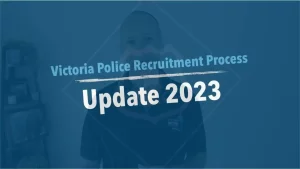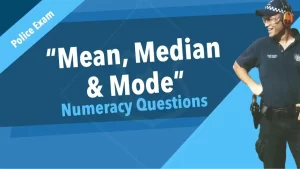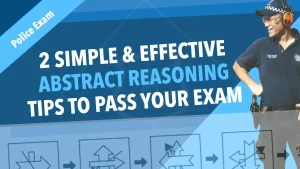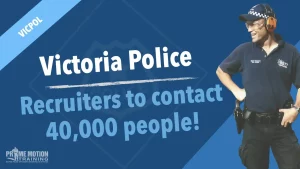A comprehensive guide to joining Victoria Police, written by former Victoria Police Academy Instructor, Russell Kempster.
Introduction
So you want to join Victoria Police!
You’ve been thinking about it for a long time and you’ve decided that now the time is right to go for it! – excellent.
When you reach that point it can be an exciting time and you probably want to get started sooner rather than later, because after all, the sooner you get the ball rolling the sooner you’ll “be in”, right?
Easy tiger, not necessarily. Let me explain.
The Victoria Police recruitment process is not simply a participation sport. It is, in fact, a very competitive process where only a small fraction of applicants end up “getting in”. Even if you do manage to pass each of the many steps in the application process there is still no guarantee Victoria Police will offer you a position.
Only the best applicants with the highest scores will be accepted by Victoria Police
Before we continue it might be helpful to understand where I’m coming from.
Who is Russell Kempster?
My name is Russell Kempster and I spent 12 years as a police officer in Victoria.
I spent four years as an instructor at the Police Academy and was involved in testing applicants, training new recruits at the academy as well as delivering more advanced training to experienced police officers.
In this guide, I want to share some tips with you to help you better navigate the application process, help you maximise your applicant score and improve your chances of achieving your dream of joining the Police.
The Victoria Police Recruitment Process
Firstly, how long is it going to take to complete the application journey?
A protective services officer (PSO) application will typically take about 6-12 months to complete while a police officer application could take 12-18 months (time frames are very much dependent on the focus of current recruiting campaigns).
Completing the application process guarantees an applicant of nothing. All it does is get you onto the waiting list. The application is such a competitive process that success will ultimately come down to how well you can score, compared to other applicants, as you navigate through the steps.
To get your application underway you will need to lodge an online application with Victoria Police. You can do that by clicking this link (Victoria Police Careers).
Doing your research
Now before you go rushing in, the first thing that you need to do, in order to give yourself the best chance of getting a good score, is to research the application process. Of course, that’s what I hope to help you with by putting this information guide together for you.
Typically what most applicants do is they put in an online application to register their interest to join Victoria Police, the Recruiting Services Branch will do some basic background checks to make sure you’re not wanted for murder, when they’re happy that you’re not, they’ll then send you an invitation to sit the Victoria Police Entrance Exam. It’s often only at this stage that many applicants begin to do some serious research.
Steps In The Application Process
- Eligibility Checks
- Entrance Exam
- Background Checks
- Video Interview
- Fitness Test
- Psych Testing
- Health Checks
- Comprehensive Checks
- Panel Interview
- Candidate Pool
Application Preparation
Let’s make sure you get off to a good start.
To officially commence your Victoria Police recruitment journey you will need to submit an online application.
The content of your application will be thoroughly checked and assessed by the Victoria Police Recruiting Services Branch. If your application is deemed uncompetitive, you may not get passed first base.
Online applications are rejected if poorly presented. Ensure you provide quality content, use correct spelling and grammar, and complete each section fully.
Details required for the application form include:
- Personal details
- Employment history
- Education history
- Any history of prior offences and any dealings you may have had with police
- Examples of sort after behaviours and values
Positions with Victoria Police are highly sort after and the process is very competitive. Just submitting an application does not guarantee you will proceed with further testing. This is your first opportunity to make a good impression!
Eligibility Checks
If your application is accepted and you’re deemed suitable to proceed, Victoria Police Recruiting Services Branch will contact you with instructions to attend the Victoria Police Entrance Exam.
Voluntary Disclosure Form
If you have any concerns about your criminal history or traffic offences, you can submit what’s called a Voluntary Disclosure Form.
Submitting this form will save you going through an application process, only to be told, “Sorry, we don’t want your application.”
Victoria Police can give you an indication, before you apply, about whether your prior offences are likely to cause problems for you with the application and whether it’s worth you even continuing.
Entrance Exam
Let’s now talk about some important information to help you get your Victoria Police application off to a good start. We’ll also discuss some tips for you to consider before, during, and after you take the Victoria Police Entrance Exam.
Before sitting your exam
The first step in your journey to a new career in policing begins by submitting an online application with Victoria Police. Once you’ve done that, and your application is accepted, you’ll be expected to take the entrance exam.
Here’s where my advice starts. I encourage you to fully understand the entire application process, and more specifically the entrance exam, before you submit the online application!
Once you submit the online application, it is expected that you understand the process and what is required of you as a Victoria Police applicant. It is also expected that you are prepared and ready to take the entrance exam.
You will normally receive a response from the Victoria Police Recruiting Services Branch (RSB) within a couple of days of submitting your application. That response will have your applicant ID as well as instructions for you to register to take the exam. The exams are conducted on Victoria Police’s behalf by the Australian Council of Education Research (Acer).
There is a fee to sit the Victoria Police Entrance Exam which is required at the time of booking. You’ll also be required to upload a photograph of yourself during the booking process. You will be able to select from the available venues and dates. Be sure to select a date that falls within the 2-month time limit! Once you’ve secured your exam booking you will be emailed an admission ticket.
Here is where you can find out more about the Australian Council of Education Research (Acer-Victoria Police Entrance Exam)
Arriving for your exam
When the big day arrives you will report to your exam venue and will be asked to produce:
- Admission Ticket
- Suitable and current photo identification (e.g. driver license)
- Black or blue pen
Calculators and other devices are not permitted!
If you arrive late you will be turned away!
You should consider your grooming and appearance when showing up for your Victoria Police Entrance Exam. Whilst business attire is not really necessary, neat casual attire should be considered a minimum standard.
Sitting the exam
The Victoria Police Entrance Exam is made up of eight sections that test a range of skills and competencies. The exam is a computer-based test, as such, you will be seated in front of a computer to take the exam. Naturally, each applicant has their own computer which is provided by the venue. An Acer staff member will be present to facilitate the exam.
How long does the exam take?
The Victoria Police Entrance Examination takes four and a half (4 and 1/2) hours to complete, with two (2) breaks each of fifteen (15) minutes. Additional time is also included for instructions and setup between exam components. All questions are presented on-screen on the applicant’s individually assigned computer.
Having a well-prepared strategy to manage your time effectively during your Victoria Police Exam will be vital to your success!
Is the exam different for Police and PSO?
Police and Protective Services Officers (PSO) sit the same exam. Police applicants are required to meet higher minimum scores to pass the exam.
What topics are covered, how many questions are there, and what are the pass marks?
Entrance Exam Components
The Victoria Police Entrance Exam includes the following components:
- Verbal Reasoning
- Numerical Reasoning
- Abstract Reasoning
- Literacy Skills
- Summary Writing
- Extended Writing
- Oral Communications
- Digital Literacy
Writing tasks are completed by entering answers directly into the computer system (typed, not handwritten).
The Oral Communications Assessment involves applicants watching a short video. When the video has finished a series of questions are displayed on the screen. Applicants answer the questions, using a desktop microphone, which is recorded for post-exam evaluation.
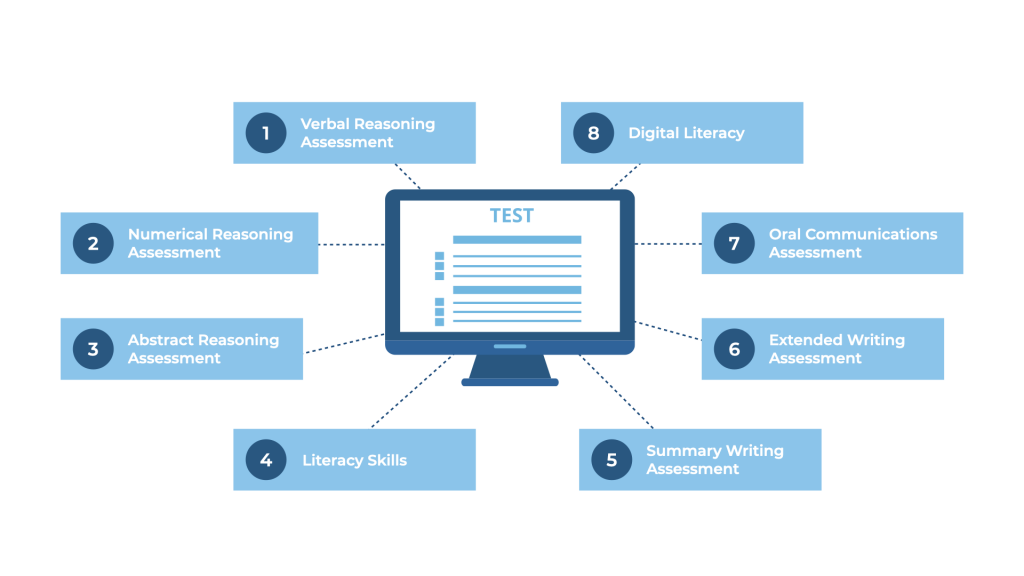
Exam Pass Marks
Here is an outline of the test sections, type of assessment, number of questions, time allowed as well as the pass marks required for both Police and Protective Services Officers.
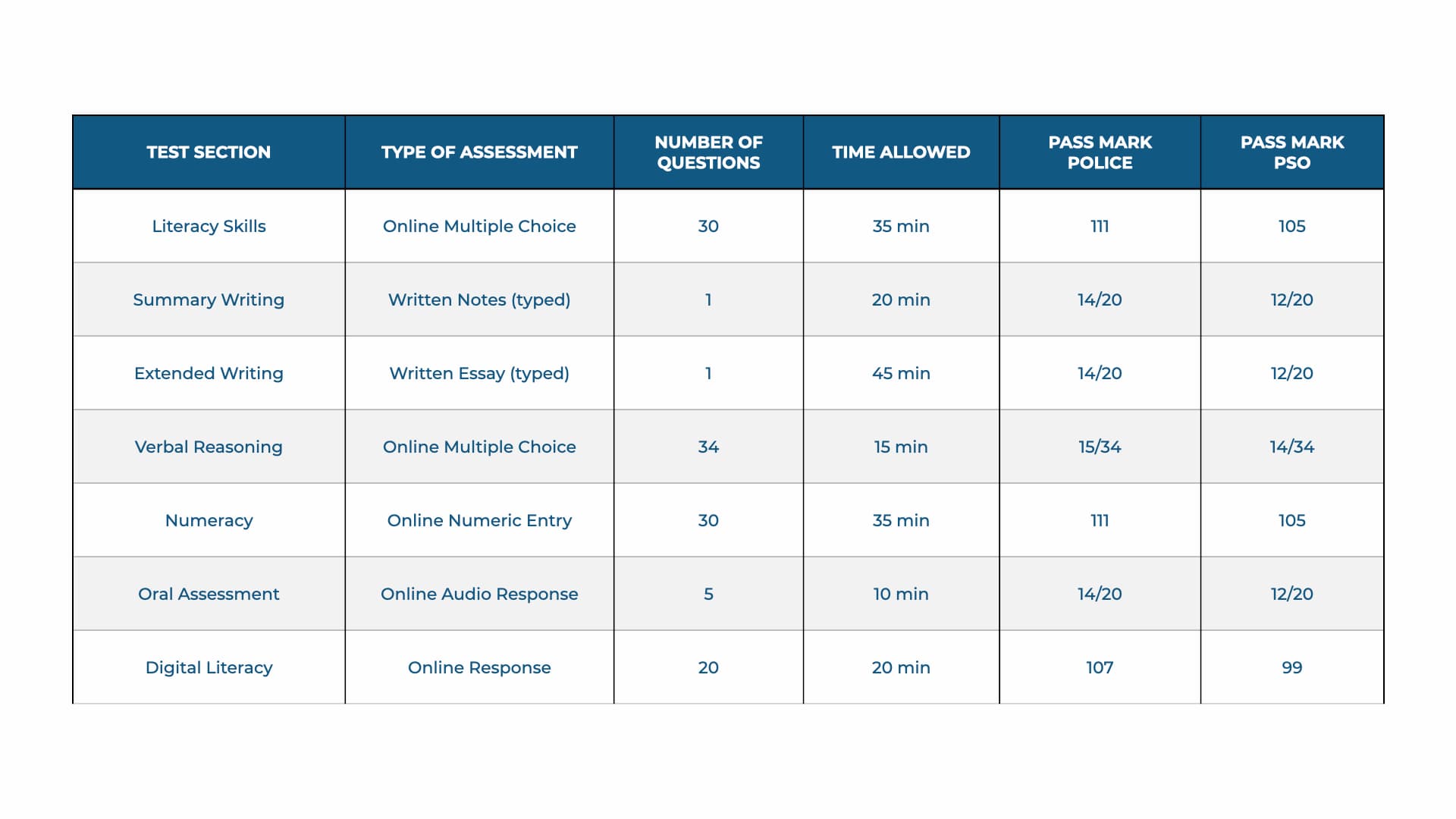
Note: The questions in the Numeracy and Literacy assessments are mapped against the Australia Core Skills Framework (ACSP) – the Australian standards for adult literacy and numeracy. The results of the assessment are reported on a scale that goes from approximately 40 up to a maximum of about 170. A score of 111 or greater is considered a performance at Exit level 3 of the ACSP or higher and this is the required pass mark.
I explain this further, in a short video, if you’d like to know more about Numeracy and Literacy Skills scoring.
What does that mean in English!? It means that you need to get at least 60% of the questions right or 18 out of the 30 questions correct in order to reach the pass mark. If you’re interested in digging a little deeper into this method, you can visit the Australia Core Skills Framework (ACSP) here.
After Your Entrance Exam
Once you have completed the exam your nervous wait begins! Applicants will receive their results via email, usually within 7 days.
What happens if I fail the exam?
Victoria Police allow two attempts to successfully pass all components of the Entrance Exam. If you fail one or more components, you will have one opportunity to re-sit (only) those components that you did not pass.
You will have a maximum of 2 months to book in for your exam re-sit. Failing to re-sit the exam within 2 months would result in your application being cancelled.
If your application is cancelled you will not be eligible to re-apply for a position with Victoria Police for a minimum of 6 months. Should you choose to re-apply you will be required to complete the application process from the beginning.
Just for interest sake
Should you pass the exam, but, fail another phase of applicant testing you would be ineligible to re-apply for 12 months, however, you would not be expected to do the entrance exam again, provided you submitted a subsequent application within 3 years.
What happens next if I pass?
If you pass your exam, you progress to the next stage of your journey. Victoria Police Recruiting Services Branch will send you an Applicant Pack which will need to be completed and returned to their office for assessment.
The Applicant Pack asks for personal information including schooling history, employment history, associations, personal references, and much, much more!
What is considered a competitive entrance exam score?
A competitive score is considered to be 80% or more. That does not mean if you don’t get 80% that it’s all over, it just means there’s a little more pressure on your performance across the remaining stages to boost your final score.
Don’t stress if you do have to take two bites at the exam cherry. This will not negatively affect your application. Your final exam score, is your final exam score, regardless.
It’s really important to get your application off to a good start. The exam carries a lot of weight and we can’t afford to take the, “I just want to pass” approach. It’s vital you get the best exam score you can. Aim high!
Just passing the Victoria Police Entrance Exam may not be enough to help you “get in”. The application process is a very competitive one so getting the best exam score possible will go a long way to helping you achieve your dream of joining Victoria Police!
Preparation is key!
Exam Preparation Options
If you’re thinking about doing the entrance exam without preparing properly to “see how you go”, you’re missing the point about how important your exam score is! There are plenty of options for applicants looking for some extra preparation help, use them, after all, you are serious about becoming a police officer, right?
You may want to consider:
- Hiring a tutor by the hour
- Attending a TAFE course
- Taking our Prime Motion Training online entrance exam preparatory course and online police practice exams
Would you like to try our Victoria Police Online Practice Exam? Check out our free resource here!
Find some help that suits your learning needs and get going!
Background Checks
Naturally, Victoria Police are looking for applicants who are of good character and reputation.
Applicant Pack
Once you’ve passed the entrance exam, Victoria Police will send you a very comprehensive applicant pack to complete and return.
You’ll need to give them your:
- employment history
- schooling history
- provide references
- and much, much more
There’s a lot of information they ask for in order to assess your character, so they can do extensive criminal background checks, and look into things like traffic offences that you may have committed in the past.
Even your associations are scrutinised closely. Who are you associating with and what’s their character, their reputation, and do they have a criminal history or pose any risk?
You have to be very careful about the circles you move in!
If you have any concerns about your criminal history or traffic offences, you can submit what’s called a Voluntary Disclosure Form.
Submitting this form will save you going through an application process, only to be told, “Sorry, we don’t want your application.”
Victoria Police can give you an indication, before you apply, about whether your prior offences are likely to cause problems for you during your application.
Social Media
Now part of checking into your background will include checks around your social media activity. You’ve got to be very careful about how you use social media. This avenue gives organisations like Victoria Police a real insight as to what you’re really like, rather than what you present yourself to be in your application.
Be very careful about what you do or don’t do on social media!
References
You’ll be asked to provide some personal references, obviously, you want to select credible people of good character to support your application. If you know any current serving police officers or PSOs, yes, absolutely they’ll usually make great referees for you.
Whilst Victoria Police is conducting background checks you’re going to need to be fairly patient. You should use this time wisely by preparing yourself for the next step in the process.
How long do background checks take?
Russ’ Tip
You can help speed things up by getting information ready in advance. Employment, school history, references, any prior offences, associations with people ‘of concern’. Get all of this information ready to go.
Whilst Victoria Police is conducting background checks, you should use this time wisely by preparing yourself for the next step in the process.
Video Interview
A Quick History Lesson For Context
There was a time when some applicants were making it through to the Panel Interview stage, and despite looking good on paper, a live interview revealed some concerns that lead to the applicant being unsuccessful.
Of course, that situation is not good for anybody. It’s not good for Victoria Police because it’s a waste of their time, and obviously, it’s not good for the applicant who has spent a long time and probably a lot of money getting to that stage of the journey only to be told they were unsuccessful and that their application had been cancelled right at the finish line.
So in January 2015, the Victoria Police introduced the Telephone Screening assessment, which later became a Video Screening assessment (Video Interview).
Is this applicant suitable to proceed?
Essentially, the video interview is used to screen out non-competitive applicants earlier rather than later, which is good for everyone involved.
How does it work?
In the Video Interview, you may be asked about the role, duties, responsibilities, and other requirements of the position you’re applying for.
You might be asked about the organisation’s values and behaviours. They’ll want to see that you’ve conducted research and you’ve put in some preparation for the video interview.
You may be asked about current issues and challenges facing Victoria Police.
Be prepared for questions about you, your experiences, your skills, and your qualities.
The Victoria Police Video Interview is an automated interview. You will need to read the questions presented on the screen, then provide appropriate answers. Your answers are recorded via video and audio which is later assessed by the Victoria Police Recruiting Team.
The video interview might seem a little daunting, but as an applicant, this is a good opportunity to get “in-person” with them on video and make a really good impression, so make the most of it!
Fitness Test
Once you clear the Video Interview you need to be ready for the Fitness Test.
Like everything else, you need to understand the requirements. What is involved in the test? What components make up the test? What scores do I need to achieve to pass? Of course, you then need to prepare yourself accordingly.
Fitness Test Components
The Victoria Police Fitness Test is comprised of 7 individual components (6 for PSO applicants)
- Illinois Agility | 20 seconds or less (19.2 from standing when Covid modifications applied)
- Grip Strength | 30kg or more
- Push Up | 5 on the toes
- Prone Hold | 60 seconds
- Obstacle Climb | 1.3m tall (not required when Covid modifications applied)
- Beep Test | Level 5.01
- Swimming | 100m in 4 minutes (Police only)
On the day of the fitness testing, you’ll attend the Victoria Police Academy where you’ll take part in the test.
Failing the Fitness Test
If you were to fail any individual components that make up the fitness test, you will get the opportunity to try that component again while you’re there. The normal procedure is to send you to the back of the line, test the other applicants, then bring you back up for a second attempt.
If you were to fail the second attempt you would be deemed unsuccessful at the fitness testing stage.
Should you fail the fitness testing stage, Victoria Police may invite you to come back at a later date for a second fitness test attempt. If you did that and you failed any component during that second attempt, your application would be cancelled for 12 months.
If you were able to complete the test the second time around, your application would continue to the next stage of the process.
Swimming Component
Just quickly, I get a lot of questions about how difficult the swimming component is. Victoria Police is not expecting a high standard of swimming ability. It’s more about you being able to swim to the side of a body of water if you were to fall in. If you fell into the Yarra River, for example, would you be able to swim to the side and save yourself?
The swimming component is not designed to test your ability to perform any type of water rescue
To complete the swimming test in accordance with the protocols, you can use any stroke or combination of strokes. You can change strokes as many times as you like. You need to complete the 100 meters in a maximum time of 4 minutes. What you can not do is to stop or pause, grab onto the lane rope, touch your foot on the bottom of the pool, or anything that might constitute assistance or rest. It must be a continuous and unassisted swim.
As an instructor at the Victoria Police Academy I was involved in plenty of applicant swimming tests and the best technique I ever saw was, what I would describe as, a dog paddling octopus! That technique, although not pretty, is perfectly acceptable, as long as you do it within the time and you complete the distance without stopping, you’ll get the tick in the box.
Note: The Victoria Police Swimming Test is no longer conducted at the Victoria Police Academy on the same day as the other fitness test components. Instead, applicants will arrange the swimming component to be done under the supervision of a suitably qualified person, such as a lifeguard or swimming instructor, and have the assessment record signed off.
Minimum Standards
Okay, let’s quickly discuss the expected standards at the fitness test. You only need to meet the minimum required to pass. When you reach that score they stop the test and you move onto the next component.
This means you don’t go on for 10 minutes pumping out 100 push-ups. You’re not going to get any extra points, it’s just a pass or a fail test.
Once the minimum standard is achieved in each component the test is stopped.
Building a fitness buffer zone
Now having said that, as a recruit at the Victoria Police Academy, if you make it that far, you will be tested with your squad at regular intervals. If you fail a Recruit Fitness Test, you can lose your position at the Academy.
A lot more is expected, in terms of your fitness level, when you turn up at the Academy, than is required to pass as an applicant.
It’s important to take a long term view of your fitness. It will help you so much when you’re in the Academy if you have a good level of fitness, because one, you never have to worry about failing the fitness test and getting kicked out, and two, you can cope better with the physical nature of the training far better if you’re fit.
The third really important thing, that you won’t appreciate until you actually get accepted for Victoria Police Recruit Training, is that a higher level of fitness means you won’t have to spend time trying to get fit, so you can use this extra time to study for the next law exam giving you a better chance of not getting kicked out for failing the law exam!
Build your fitness to pass the applicant test, then keep building to create a buffer zone for the Victoria Police Academy
Psychological Testing
There are two touchpoints for the psychological testing component of your application, the first is a computer-based test and the second is a one-on-one interview.
Computer-Based Psychological Questionnaire
When you attend the Police Academy for your fitness test and pass, you will be asked to complete a computer-based psychological questionnaire while you are there.
The questionnaire is broken into 3 sections
- The M-PULSE™ Inventory (Matrix Predictive Uniform Law-Enforcement Selection Evaluation)
- The PAI® (Personality Assessment Inventory)
- The NEO Five-Factor Inventory
This is not a test, you don’t need to know anything special or research anything. You will, however, need to be open and honest to avoid painting yourself into a corner.
Do not give the answer you think they want! Be honest
One-On-One Psychological Interview
A few weeks/months after successfully completing the fitness testing day, you’ll receive an invitation to attend a one-to-one interview with a psychologist.
There’s really nothing off limits as far as the interview is concerned. They want to know that you have the skills and qualities from a psychological perspective to be able to cope with police work and that you meet the inherent requirements of the role.
The interview could go for anything from 30 minutes to an hour or more. It is very comprehensive. The results from your questionnaire may form part of the discussion.
It is important that you be honest and open during the interview. If you’re guarded or defensive because you don’t want to say the wrong thing, you’ll likely end up saying the wrong thing!
The interview is not the opportunity to sell yourself. Don’t bother telling them how wonderful you are. Just be yourself.
Don’t be afraid, to be honest. The psychologist needs to feel they understand you in order to make a positive recommendation.
It’s normal human behaviour to experience a range of emotions like gratitude, sadness, fear and anger. Give some thought to triggers that might cause different emotions in you and what you do to respond or deal with them. Be prepared to share specific examples.
Be prepared to explain how you might deal with different policing scenarios that you might come across as a police officer or PSO too.
Health Checks
Victoria Police applicants are required to complete a comprehensive medical booklet. You will need to visit your doctor to get the usual assessments, blood pressure check, eyesight, hearing etc. done in order to complete the booklet.
Existing or Previous Serious Injuries
If you’ve had surgery in the past or suffered serious injuries or conditions, you should start obtaining reports and letters from your treating specialists in advance to ensure returning your medical booklet is not delayed.
Generally, applicant Medical booklets are provided after the fitness testing has been completed successfully.
Comprehensive Checks
The further you progress through the application testing phases the deeper Victoria Police will investigate and assess you. The Victoria Police Code of Conduct and the Organisational Values provide an important assessment tool for the Recruiting Team to determine your suitability.
Showing integrity, respect and professionalism is vital to demonstrate your suitability.
At this point in the journey your employment status and employment history, any people you associate with, your online presence as well as any involvement you may have had with police or other agencies will be heavily scrutinised.
Disclosing information to Victoria Police to assist them in conducting a risk assessment is expected. Failing to fully and honestly do so would raise concerns about your integrity and would adversely affect your chances of success.
Selection Panel Interview
Now we’re going to take a look at my favourite step in the process, the Selection Panel Interview. The reason it’s my favourite step is that it’s the most important step in the process, in my opinion.
Really, the interview is for those applicants who have essentially been “qualified”. You’ve done the exam, a video interview, fitness testing, medical testing and psychological interview, they’ve checked your background, your associations and so far so good, so now it’s time for the big one.
You only get one chance at the Panel Interview
Unlike some of the other steps in the application process, you don’t get to go back and have another go if you’re not fantastic the first time. You get one shot at doing your Panel Interview and because it carries a lot of weight we absolutely must make it count!
Your job is to provide evidence that you have the skills and qualities they’re looking for. Convince them, prove it!
Give some serious thought to proving specific examples of high-quality life experiences you’ve had that are relevant to the position.
Selection Panel Interviews are usually conducted at the Recruiting Services Branch office at the Victoria Police Centre in Melbourne. The panels normally consist of 2 interviewers and the applicant. You can expect the interview to be video taped.
What questions will they ask?
You’ll be asked a range of general questions, behavioural based evidence questions and scenario-based questions to allow the panel to assess you against the key performance indicators of the position.
Of vital importance is the need to provide specific evidence when addressing behavioural based evidence questions. You’ll recognise these questions by their wording. Questions that ask for examples of when you have done something, for example:
“Can you give an example of when you’ve had to make a difficult decision under pressure?”
How to structure your answers
- Explain the circumstances to show relevance and provide context
- Outline specific actions you took in that situation that provide evidence of the skills in question
- Link the positive outcome to the actions you took
- Stop waffling on and wait for any clarifying questions!
When answering scenario style questions:
Consider the Organisational Values and Code of Ethics when responding to scenario style questions.
You may also be asked to explain how you would handle different policing scenarios. This is an opportunity to demonstrate common sense, good judgement, a strong aptitude for the role and that your values and ethics are consistent with those of Victoria Police.
At the completion of the panel interview, you may have to wait a few weeks until you hear of the outcome. Feedback is rarely given at the end of the interview so the wait can be excruciating!
Candidate Pool (Order of Merit)
If you pass the Panel Interview and you’re deemed suitable you’ll be placed in the Candidate Pool (also known as the Order of Merit). Essentially this is a waiting list for every applicant who has completed the application process successfully.
Applicants are placed on the waiting list and graded by their overall applicant score. So, of course, the highest scoring applicants go to the top of the list and will be offered the next available positions. Lower scoring applicants are placed lower down the list. This is regardless of when you completed the application process.
Once you reach the Candidate Pool it becomes a simple matter of numbers:
- How many squad intakes will there be?
- When is the next squad’s starting?
- Where am I on the waiting list?
- How many people are in front of me on the list?
Unfortunately, Victoria Police normally don’t make this information available.
It’s quite possible that you could get onto the waiting list and never be offered a position
If you’re near the top of the list you might be offered a position within weeks, however, if you are further down the list it could take months and it’s also possible that if your score is not competitive enough it’s likely that you may never be offered a position.
While you’re waiting for the next squad intake if other applicants join the Candidate Pool with a higher score than yours they will jump you in the queue.
Don’t underestimate how competitive this process is!
Victoria Police Recruit Training
When all of your patience and hard work is rewarded with a letter of offer from Victoria Police it will be one of the most satisfying and exciting things to happen to you.
It was a long time ago, but I still remember very clearly when it happened to me, and since then, I’ve celebrated with more than 4,000 of my members when it’s happened to them too.
Starting Recruit Training is exciting, you’ll normally receive notification around 6 weeks before your induction to the academy.
It’s a great place to learn and you’ll love being at the academy. I have very fond memories of being a recruit and of course going back later to take up a role as an instructor there.
I can’t emphasise enough how important it is that your final score is strong. Your score is going to have the biggest impact on whether you get in or not.
Wrapping Things Up
Well, there you go, do you still want to join the Victoria Police? Of course, you do.
I hope this information has been helpful, please reach out if you’d like to connect with me and I wish you all the very best with your journey to achieve your dream of joining Victoria Police.
